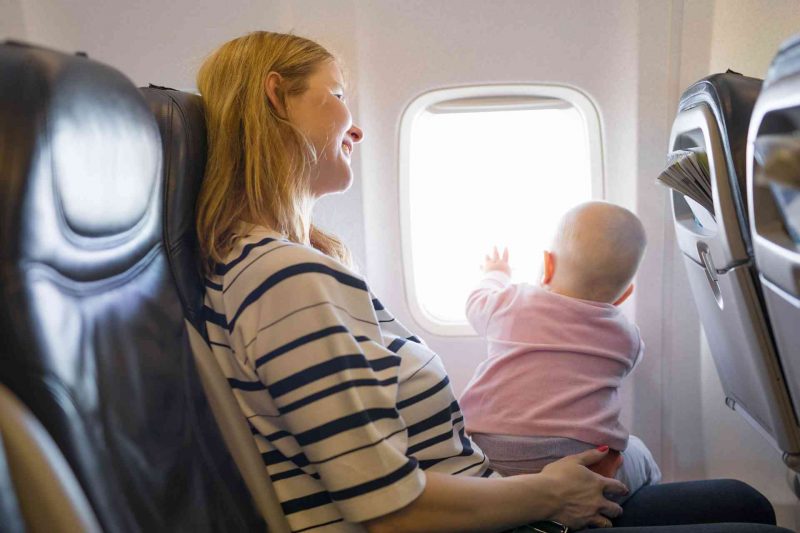While becoming a parent can be an incredible and priceless experience, it requires adjustments to just about every portion of your life. For those who frequently travel by plane, taking along a newborn can be quite the adjustment.
Many parents swear off air travel for several months. However, parents often have to make many difficult decisions. So should you take a newborn on a plane?
Buckle your seat belts and put your trays in the upright position; we’re diving in to see what parents of newborns should do when flying. Let’s get started!

How Soon Can You Travel With a Newborn?
Just because you have a newborn doesn’t mean you must stop traveling. However, you should consult your newborn’s medical professional before embarking on a trip. If your baby has any medical conditions, a doctor may encourage you to avoid certain types of travel.
Traveling with an infant will involve more planning and require you to make some adjustments. However, newborns are much more capable of traveling than many people give them credit for. Though, depending on the type of travel, you may need to delay some plans until your infant is a bit older.
Regarding air travel, policies around newborns vary based on the airline. Airlines typically require babies under 14 days old to have a medical release from the newborn’s doctor.
However, because policies vary from airline to airline, you’ll want to check the policies before purchasing your ticket.
Should you Take a Newborn on a Plane?
As we said, being a parent means making many tough decisions for your child. Just because an airline will allow a newborn to fly doesn’t mean it’s always safe or wise.
Camille Sabella, MD from the Cleveland Clinic, says, “An infant’s immune system doesn’t mature until they’re about two to three months old.”

Sometimes parents have valid reasons for traveling by air with a newborn. However, parents should check with their medical professional before making a decision. While some newborns can handle getting on a plane, that’s not the case for every newborn.
HOT TIP
Are RVs Safe for Babies?
Do Babies’ Ears Hurt on Planes?
Just like many older children and adults, babies can experience discomfort in their ears on planes. The changes in pressure while flying can be uncomfortable.
Some newborns make the adjustment better than others, which means the infant may cry more. This can make for a long flight for the parents and the other passengers on the plane.
How Do I Protect My Newborn’s Ears When Flying?
Many passengers on planes, no matter their age, experience some discomfort in their ears when flying. While older passengers may chew a piece of gum or suck on their favorite candy to relieve pressure, newborns cannot. Luckily, babies love to eat.

Many parents find that the sucking motion can do the trick, whether from breastfeeding or a bottle. Timing feedings so the baby is hungry during takeoff and landing can increase the effectiveness of this method. However, it’s not just the pressure parents worry about for their newborn’s ears.
Airplanes can be loud, especially on new ears still adjusting to sounds. Some parents use over-the-ear headphones to help minimize the impact of loud noises.
What Are the Rules for Flying With an Infant?
Rules for flying with an infant vary from one airline to the next. Most airlines don’t require babies (those under two years old) to have a separate plane ticket.
However, the infant must sit on a parent’s lap, and parents can only hold one infant at a time. If a parent wishes for their child to sit in an airline-certified child restraint seat for optimal safety, they’ll need to purchase a ticket for them.

While infants don’t need a ticket, parents still must add them to theirs. This allows the airlines to account for all passengers on the plane. Parents can add their baby to their ticket by visiting the ticket counter at the gate or speaking with guest services.
Some may require parents to show a birth certificate to prove the infant’s age or relationship, so ensure you have the proper documents.
What If My Baby Cries on the Plane?
A crying baby is every passenger’s worst nightmare. You should do your best to console your baby, but remain calm. A baby can sense your stress and frustration, which won’t help to calm them.
Will some passengers be upset or frustrated? Absolutely. However, you can only do so much to console a baby. Have as many tricks in your bag as possible to help alleviate the situation, but don’t let the opinions or stares from others bring you down. Some travelers are just grumpy and look to spread it to others.
Is Flying With an Infant Hard?
Flying with an infant can be challenging, but it’s not impossible. Your packing list will increase, and you’ll need to consider the logistics of flying with a newborn. And you’ll need to consider departure times and minimizing layovers.
However, if you fly regularly, you’ll quickly find the travel style and tricks that work for you and your infant. You’ll likely have good and bad flights, but they’re only temporary. So enjoy every second you can.
If You Want the Latest Travel News, Join Our Mailing List
Don’t rely on biased RV industry news sources to keep you informed. Stick with Nomadic News. We publish articles and breaking stories that matter to you every weekday.










